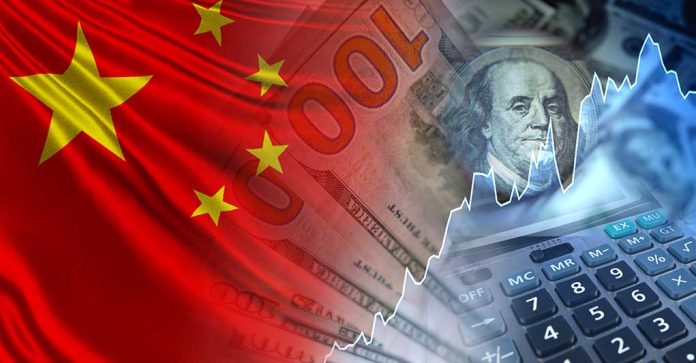
China slaps 84% tariff hike on US goods as President Trump’s 104% tariffs take effect, plunging both economic superpowers into an escalating trade war with potentially far-reaching global consequences.
Top Takeaways
- China has retaliated against Trump’s 104% tariffs by increasing duties on US goods to 84% and filing a complaint with the WTO.
- Beijing is threatening additional countermeasures including restricting Hollywood films, banning US poultry imports, and suspending fentanyl enforcement cooperation.
- Trump has encouraged companies to relocate to America to avoid tariffs, promising “ZERO TARIFFS” for businesses that move production to the US.
- The escalating trade war has already disrupted global markets, with significant drops in European indexes and fears of deeper economic decoupling between the world’s two largest economies.
- Many foreign governments are awaiting communication from the US about potential negotiations, while the EU has approved its first retaliatory tariffs against American goods.
China Vows to “Fight to the End” in Escalating Trade Conflict
The trade tensions between the United States and China have reached a new boiling point as Beijing announced an 84% tariff on American goods in direct response to President Trump’s implementation of substantial new tariffs. The Trump administration has imposed a 50% tariff on Chinese imports, which comes on top of existing 34% reciprocal duties, bringing the total tariff rate on Chinese goods to an unprecedented 104%. This marks a significant escalation from the previous trade conflict during Trump’s first administration and signals a potential long-term economic confrontation between the world’s two largest economies.
China’s Commerce Ministry has formally filed a complaint with the World Trade Organization against the US tariff increases, demonstrating Beijing’s willingness to challenge what it views as unjustified economic aggression through international channels. Meanwhile, Chinese officials have adopted increasingly combative rhetoric, with state media quoting government sources vowing to “fight to the end” in this renewed trade conflict. The swift and substantial retaliation suggests China is taking a more aggressive stance than during the 2018 trade disputes.
104% tariffs on China are not enough. I'm advocating 400%. I do business with China. They don't play by the rules. They've been in the WTO for decades. They have never abided by any of the rules they agreed to when they came in for decades. They cheat, they steal, they steal IP.… pic.twitter.com/iotEgmNQrr
— Kevin O'Leary aka Mr. Wonderful (@kevinolearytv) April 9, 2025
Potential Additional Countermeasures from Beijing
Chinese commentators with connections to state media have outlined potential additional retaliatory measures that Beijing might implement if trade tensions continue to escalate. These include increasing tariffs on American agricultural products like soybeans and wheat, implementing a complete ban on US poultry imports, and restricting Hollywood’s access to China’s massive film market. Such targeted actions would specifically impact key US industries and states that have traditionally supported President Trump, potentially creating domestic political pressure on the administration.
Of particular concern to American officials is the suggestion that China might suspend cooperation on fentanyl enforcement. The latest US tariff increases were partly justified as a response to China’s role in supplying fentanyl precursor chemicals. Chinese commentators have noted that Beijing could halt cooperation on fentanyl interdiction efforts as leverage in the trade dispute, potentially complicating America’s efforts to combat the opioid crisis. Additional proposed measures include imposing new restrictions on US firms operating in China and limiting access to China’s services market.
Global Implications and Market Reactions
The escalating trade war has already sent shockwaves through global markets, with European indexes experiencing significant drops as investors react to the potential disruption of global supply chains. The European Union has approved its first retaliatory tariffs against the US, ranging from 15% to 25% on various American goods, effective next Tuesday. EU trade ministers have discussed a broader €25.7 billion tariff package on US products in response to American tariffs on steel and aluminum, highlighting how the US-China trade tensions are rippling outward to affect global trade relations.
“Many of us have already written to them asking for meetings,” an unnamed official from the Philippines told Politico. “We are all waiting for the reply.”
President Trump has claimed that China and other countries are eager to negotiate, with talks reportedly beginning with Japan and South Korea. However, many foreign governments have indicated they are still waiting for communication from the US regarding potential negotiations. Trump has encouraged businesses to relocate production to the United States to avoid tariffs, promising “ZERO TARIFFS” and “no environmental delays” for companies that do so, signaling his administration’s prioritization of domestic manufacturing over global trade integration.
Concerns About Economic Decoupling
The current trajectory of US-China trade relations suggests a potential deeper economic decoupling between the world’s two largest economies. This shift would have profound implications for global supply chains, potentially increasing costs for consumers worldwide and accelerating the reorganization of international commerce into competing economic blocs.
French Trade Minister Laurent Saint-Martin has emphasized the importance of avoiding further escalation and called for negotiations with the United States, reflecting broader international concerns about the stability of the global trading system. However, with both Washington and Beijing appearing to dig in for a prolonged economic confrontation, the prospect of a quick resolution seems increasingly remote. The ongoing trade tensions between the US and China underscore the complex challenges facing the global economy as geopolitical competition increasingly influences economic policy decisions.






















